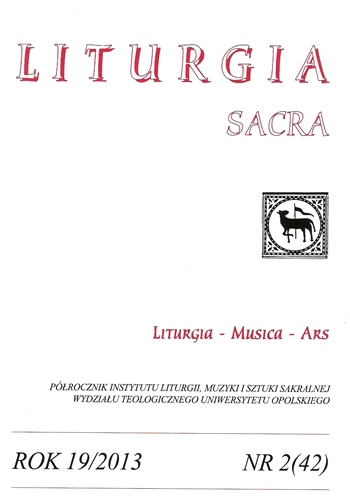Wprowadzanie soborowej odnowy liturgii na przykładzie diecezji opolskiej
Introducing the Conciliar Liturgical Renewal on the Example of The Opole Diocese
Author(s): Erwin MatejaSubject(s): Christian Theology and Religion, Theology and Religion
Published by: Uniwersytet Opolski
Keywords: Conciliar Liturgical Renewal; Opole Diocese
Summary/Abstract: The Jubilee of fiftieth anniversary of adopting liturgical constitution celebrated in the academic community of Opole requires considering remarkable achievements connected with the introduction of the liturgical renewal which had its place in the local Church of Opole during recent period of time. Notable benefits were gained owing to actions of specific people. One of them is Bishop Franciszek Jop who served as a Chairman of Liturgical Commission in the Polish Episcopate from 1962 to 1975. Accepted function obliged him to active participation in subsequent work of the Second Vatican Council and Roman Commission. As Bishop of Opole Franciszek Jop was responsible for the post-Conciliar liturgical renewal in his diocese. He reorganised the Opole liturgical commission and encouraged its members to active involvement in familiarizing the Faithful with Polish-language version of liturgical books, process of adaptation former forms of pastoral liturgy into the current one and considered as most important, in developmental works of clergy and congregation. Those who most eagerly responded to Jop’s appeal were clergymen from Opole: Wacław Schenk and Helmut Sobeczko. Their great cooperation in the aspect of the new systems’ creation will be presented in the article, dedicated especially to priests and catechists. Further there will be discussed regularly improved prayer book Droga do Nieba and German-language confessionals. Mentioned prayers will be also considered in the aspect of their influence on post- Conciliar shaping of religiousness of the Faithful in Upper Silesia. Looking at the reception process of the post-Conciliar liturgical renewal from the perspective of fifty years it is legitimate to claim that the very process has not been finished yet. It can be observed in gradual introduction of Extraordinary Minister of Holy Communion and Permanent Deacon. Nevertheless, it should be admitted that plenty has been achieved. The Paschal Mystery could contribute to changes, so the Faithful could express and reveal others the Person of Jesus Christ and the actual nature of the real Church.
Journal: Liturgia Sacra
- Issue Year: XIX/2013
- Issue No: 42
- Page Range: 357-369
- Page Count: 13
- Language: Polish
- Content File-PDF

